“Happy, though unaware of it, are those nations of the world who do not have
civilization-destroying neighbours”.*
The purpose of this current paper is to determine the issue of the Armenian monuments in the territory of Georgia, which are under a complete and intentional neglect by the Georgian Government. We will mainly touch upon the vulnerable condition of the Armenian Churches in Tbilisi the “owners of which are still disputed”.
The policy of destruction and misappropriation of Armenian cultural monuments by the neighbouring peoples is a common occurrence throughout the Armenian history. But what is worrying me is the following: the “Christian Georgia”, where the Armenians have always comprised a significant part of its population, who have greatly contributed to building Georgia’s modern capital, Tbilisi, and had a very important role to play in terms of Georgia’s national self-determination, has now adopted an anti-cultural policy against Armenian cultural heritages (though in Tbilisi one will find a Greek church turned into a Georgian Orthodox Church).
The matter is that the vandalism against the Armenian cultural monuments in Georgia is not in the best interests of the Georgian people and can result in the damaging of the good relations between the two neighbouring peoples.
Historical Background
According to historical materials the Armenian church in Georgia has been a recognized separate religious entity since 5th century AD. One of major Armenian medieval historians, Oukhtannes, reports that in the 5th century, in the Georgian town of Tsurtavi, there was an Armenian prelacy under the jurisdiction of the Armenian Patriarch, led by a bishop called Movses.
Another historian, Matheos of Urkha, reports that during the reign of Georgia’s king David IV the Builder Armenian church in Georgia was officially granted status of a recognized diocese. St. George’s (Surb Kevork) Armenian Cathedral of Tbilisi was then its administrative centre.
During fifteen centuries of Armenian ecclesiastical presence in Georgia over six hundred religious and cultural sites, namely churches, seminaries, monasteries, were created by members of the Armenian Church. A portion of these sites is now non-existent due to natural disasters, vandalism, and other factors.
When the Caucasus was split into ethnic republics (the collapse of the Soviet Union), and Tiflis became the capital of the Georgian republic, the number of Armenians in the city slowly but irrevocably began to diminish. In the 1950s, every third resident of the city was Armenian. According to the most recent census, taken in 2002, Armenians make up 14 percent of the city’s inhabitants, and six percent of the population in all of Georgia. For the first time in centuries, there are more Azerbaijanis than Armenians in the territory of what is now Georgia.
When Mikhail Gorbachev introduced perestroika and glasnost in the 1980s, Georgia was one of the first republics where, one after the other, churches began reopening their doors. The Armenian side insists that in Tbilisi alone, at least seven Armenian churches were reopened – but, of course, not reopened and reconstructed as Georgian Orthodox churches.
During the last 20 years the Georgian government has been doing its best to wash off all the traces of the Armenian unique architectural style from the Armenian churches. The destruction of a whole building is not excluded either. We should be grateful to them from time to time for keeping some of the churches, having turned them into ‘dog-shelters’ (Georgian neighbors keep their dogs in the courtyard of St. Nshan Church, built in 1701, although there is a sign on the church that reads, “Protected by the state”).
One thing is really bothering: why the number of the Azerbaijani inhabitants in Georgia has increased? Has it any ties connected with the tough and unreasonable attitude of the Georgian authorities towards the Armenian cultural monuments as well as the Armenian Diocese in Georgia?
Accordingly I would say that the sense of nationalism (in a disapproval meaning) in Georgia is now accepted in a higher level. Georgian scientific establishment corporately with mass-media periodically launch anti-Armenian campaigns in press and television. One example of such discriminatory and illogical attitude is the reaction of press to the Armenian Diocese’s publication of the fact of existence over six hundred Armenian Christian sites in Georgia throughout the history of Armenian presence in Georgia. Georgian public was misled by media accusations of the Armenian Church of demanding six hundred temples’ rights of ownership. In fact, the Armenian Church has never demanded six hundred churches back into its domain, and it is a very much regrettable fact that the Georgian public was misled by public-financed media institutes.
Another matter of utter importance to the Armenian Church is the issue of ownership of the Armenian temples, built by Armenian Apostolic Church, unto which the Armenian Church had full rights up to the Soviet period of Georgia’s history. Communist government of the Soviet Union has nationalized Armenian temples but after restoration of Georgian sovereignty the temples haven’t been returned to their lawful owners.
The ‘Disputed Churches’
There is another issue that requires serious attention. It is very common in Georgia to hear from all sorts of officials that the Armenian churches are actually ‘disputed’ as in to which denomination they belong. What is striking of all is that they suggest that there should be a special committee which will determine historic ownership of these churches. But in fact, all Armenian churches are marked by several features, only found in Armenian ecclesiastical architecture.
All Armenian churches, including so-called ‘disputed’ churches of Georgia, have their altars at a particular height, determined by the Armenian Church canon. Georgian church altars are at all times built at a much lower level than the Armenian altars. Also Armenian baptisteries are always found in a northern niche of any Armenian church. These features are not found in any other architecture tradition apart from Armenian. All ‘disputed’ churches are marked by these features.
Anyways, one may see here the exact continuation of changing the history a policy that nears vandalism. A bright example of it is the idea of suggesting a special committee determined by the Georgian government concerning the origin of those Armenian churches, as if we have nothing to do but taking Georgian destroyed churches, reconstructing and making them ours.
The Armenian Apostolic Church, more specifically the Georgian-Armenian Diocese, with its limited financial resources and staff simply cannot also take care of those “disputed” churches. The churches are legally within the Georgian government’s authority. As long as those churches are “disputed,” they are subjected to total neglect because the Georgian-Armenian Diocese is not legally allowed to take care of them and the Georgian state refuses to repair them or provide for their maintenance.
Among the other “disputed” Armenian churches:
- The Shamkoretsots or Red Bible Church found in the Havlabar neighborhood is almost completely destroyed. There are allegations that the church was bombed in 1989.
- The basilica of Minas Yerevantsots is also semi-ruined, Georgian refugees from Abkhazia live in its courtyard.
- The interior of Saint Gevorg Mughnetsi Church in the Sololag neighborhood of Tbilisi is also destroyed.
- St. Nshan, in the center of Old Tbilisi, is in poor condition and will not last long.
The Georgian side is not indifferent toward Norashen, which is located right beside a Greek church which by the way has been made into a Georgian church. What makes the Georgian authorities to realize their evil plans is that the number of Armenians living in the vicinity of those churches has considerably decreased. They were not only attending the churches but also were guardians.
So the gradual destruction and misappropriation both by the Georgian state and ecclesiastical leaders is to be observed here. A few years ago, Father Tariel systematically collected Armenian tombstones from the Norashen church’s property and replaced them with Georgian ones to prove that the church was indeed Georgian. A number of representatives of the Armenian community witnessed how the tombstones of benefactors Mikhael and Lidia Tamamshyan were destroyed in broad daylight. With the intervention of the Armenian community, the destruction was halted . . . probably until the next wave of destruction.
The fact that the Georgian intelligentsia have not opposed to the cultural genocide, planned and purposefully carried out particularly in the recent ten years, makes us believe that the authorities of that country have succeeded in contaminating the intelligentsia with unhealthy attitudes. The misappropriation of churches…What shame and vandalism! Can people of such inferior instincts govern nations and preach any religion?
Conclusion
I came to a conclusion that this so-called ‘Georgianization’ is witnessing the unhappy fact that the Georgian government has to solve a very important issue within its country, the freedom of conscious: there is no religious minority in Georgia to have an official status, eventually state-established churches. Whenever the Armenian Diocese in Georgia demands from the Georgian Clergy to solve this problem, they bring forward the excuse that it is the Government who must pass a proper law first of all.
Aftermath of the Soviet Union collapse had its distracting effect on the future of the Armenian monuments. Thousands of Armenians had to leave Georgia because of bad living-conditions. They were not much concerned with the opening of the churches when they were facing survival issues.
But today even if there are not much Armenians left there, this issue is of a high importance both in Armenia and in Georgia. An example of it is the person of Samvel Karapetian, a scientist-hero who has dedicated his life to the struggle against the policy of destruction or appropriation of Armenian cultural monuments and the conscious Armenian Diocese in Georgia.
Anyways, the careless and indifferent attitude of the Armenian government towards the destruction of the historical and cultural monuments of their own people is very irritating.
If Georgia carries out all those destructions on a governmental level no Religious authority (the Armenian Diocese in Georgia) has the power to oppose it. It is an issue which has to be solved by the two Governments of Georgia and Armenia.
*(Center for the study of national cause and genocide.
The Armenian Genocide, Causes and Lessons, v. 2, Yerevan, 1995, p. 30)
Karine BAGHDASARYAN / Yerevan
 The rally on Parliament Hill Saturday was followed by a march to Ottawa’s Turkish Embassy. (CBC)Hundreds of Armenian Canadians rallied in Ottawa Saturday for Turkey to recognize the killing of 1.5 million Armenians nearly a century ago as a genocide.
The rally on Parliament Hill Saturday was followed by a march to Ottawa’s Turkish Embassy. (CBC)Hundreds of Armenian Canadians rallied in Ottawa Saturday for Turkey to recognize the killing of 1.5 million Armenians nearly a century ago as a genocide.
 Robert Kouyoumdjian, executive director of the Armenian National Committee of Canada, said similar events to Saturday’s rally will be held annually until Turkey recognizes the killings as a genocide. (CBC)Ottawa police had expected about 1,000 people to turn out for Saturday’s rally. Speakers included Ottawa-Orleans MP Royal Galipeau and Scarborough-Agincourt MP Jim Karygiannis, who brought forward the 2004 private member’s bill leading to Canada’s recognition of the genocide.
Robert Kouyoumdjian, executive director of the Armenian National Committee of Canada, said similar events to Saturday’s rally will be held annually until Turkey recognizes the killings as a genocide. (CBC)Ottawa police had expected about 1,000 people to turn out for Saturday’s rally. Speakers included Ottawa-Orleans MP Royal Galipeau and Scarborough-Agincourt MP Jim Karygiannis, who brought forward the 2004 private member’s bill leading to Canada’s recognition of the genocide.
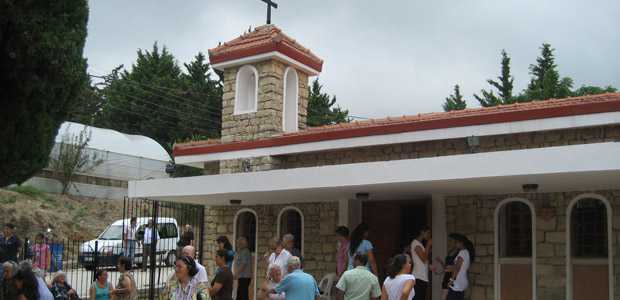
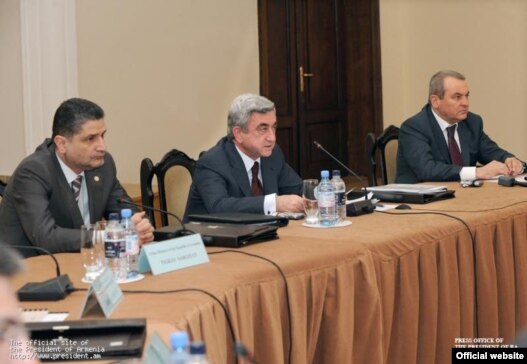
 Armenia — President Serzh Sarkisian (C) speaks at a meeting of the Council on Atomic Energy Safety in Yerevan, 27 April 2010.
Armenia — President Serzh Sarkisian (C) speaks at a meeting of the Council on Atomic Energy Safety in Yerevan, 27 April 2010.
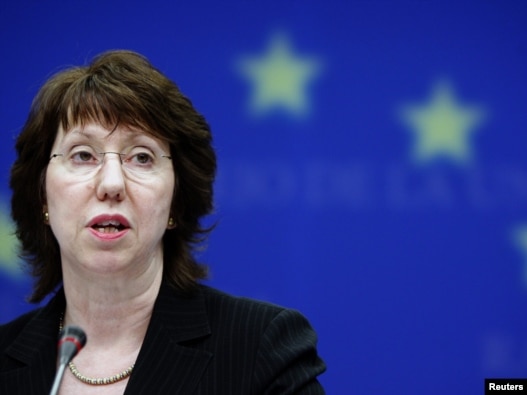
 Belgium — EU High Representative for Foreign Affairs and Security Catherine Ashton holds a news conference after a EU foreign ministers meeting in Brussels, 22Mar2010
Belgium — EU High Representative for Foreign Affairs and Security Catherine Ashton holds a news conference after a EU foreign ministers meeting in Brussels, 22Mar2010
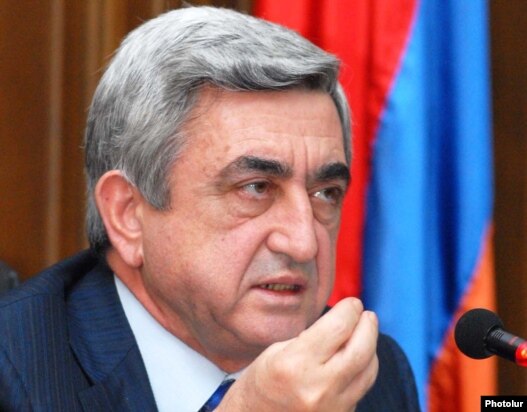
 Armenia — President Serzh Sarkisian addresses the parliament’s Audit Chamber on January 22, 2010.
Armenia — President Serzh Sarkisian addresses the parliament’s Audit Chamber on January 22, 2010.



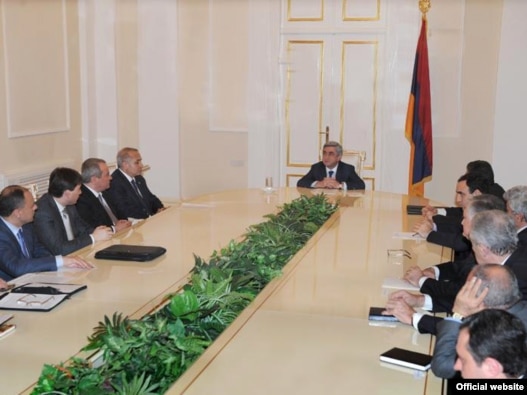
 Armenia — President Sarkissian holds a meeting of National Security Council, 21Apr2010
Armenia — President Sarkissian holds a meeting of National Security Council, 21Apr2010